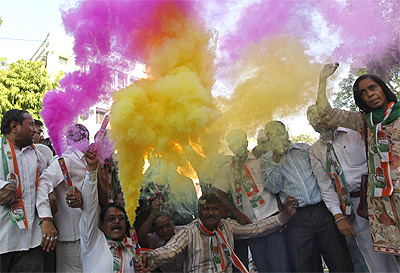By speaking out against Manmohan Singh, by constantly bashing the UPA/Congress, Narendra Modi by 2014 will be like a television show in replay mode.
In winning the intra-BJP battle, he runs losing the war with the UPA, feels Amberish K Diwanji.
 It is almost blasphemous to say this, but there may be some truth in what Sonia Gandhi boasted about a few days ago: That the UPA will return to power in 2014.
It is almost blasphemous to say this, but there may be some truth in what Sonia Gandhi boasted about a few days ago: That the UPA will return to power in 2014.
Every quantifiable indicator tells us that the UPA doesn't deserve a third term. In fact, many would say it didn't deserve a second term, but that is another story.
Here are some reasons why this may just happen.
1. As of now, the rupee and the economy are racing against each other to see who hits rock bottom first. There is a general mood of despair in the air. But general moods are poor indicators of voting patterns.
The mood 2004 was one of 'India Shining'. Today we know that India then was truly shining, and every indicator was that the BJP deserved to win, but the party's mishandling of Gujarat and its arrogance saw it kicked out.
This should give the Congress/UPA hope that there exist segments that are never influenced by sentiments and pre-poll opinions.
2. The Congress continues to appeal to the largest segment of Indians, be it Muslims, Dalits, Adivasis, and minorities of all hues. The last bit is usually under-rated.
For instance, north Indians in Mumbai will back the Congress because they fear the BJP ally, the Shiv Sena and its Mumbai for Marathis agenda. The same north Indian in his village in UP or Bihar may never vote for the Congress there, but in Mumbai his bigger concern is his safety.
3. Moving closer to April 2014, the economic situation might improve to make August 2013 look distant. So far the monsoons have been fantastic, the US economy appears to have bottomed out, and for all one knows the economic rebound is just months away.
With things looking up, the middle-class, the UPA's most trenchant critic at present, might just be willing to forgive and forget. This is the segment whose 'sentiments' currently are anti-Congress, and this might change.
Also, while they may not necessarily vote for the Congress, the strong anti-Congress, pro-BJP sentiment will abate.
4. Sharad Pawar is an astute observer of politics. His statement that Narendra Modi may have peaked too early may be bang on. May 2014 is more than eight months away; in politics that is a lifetime.
By speaking out against Manmohan Singh, by constantly bashing the UPA/Congress, Modi by 2014 will look and sound like a television show in replay mode.
To be fair, Modi is also a shrewd politician and is no doubt aware that he runs the risk of peaking very early, but as of now he has little choice.
Given his foes within the BJP, he has to stamp his authority on the party as soon as he can. But in winning the intra-BJP battle, he runs losing the war with the UPA. Modi is battling too many foes.
5. The Ayodhya fiasco has apparently made the BJP and the Samajwadi Party happy, with both believing they will gain from Hindu and Muslim votes respectively. But is it so simple?
Can yatras that remind us of the late 1980s and early 1990s work in India today? A nervous Muslim population might prefer backing the Congress if only to give it the numbers in the Lok Sabha to keep the BJP out.
And for millions of Hindus, who have happily moved on to the development bandwagon, a throwback to the yatras of the 1990s is hardly appealing.
Moreover, the blatant communal appeal by the BJP and the Samajwadi Party to their respective supporters might just show the Congress as the party in shining secular light.
In India, religious concerns trumps economic fears. Always
6. The Congress's food security bill might be a game-changer. Sure it will strain the economy, but a year before elections, it sends a strong message to the poor about a party that cares for the poor.
Every criticism of the food security bill gives the message that if the rich are against it, it must be right.
7. Rahul Gandhi boasted the other day that if India were a computer, the Congress is the default option. Millions may detest this statement, but it is, alas, so true.
Like so many computer programmes, the default setting is full of bugs and how we wish we had a better option, but after tinkering here and there and finding the computer settings even more complicated, we just click on the 'Restore Default Settings' button.
It is bad, but the alternative options are worse.
Image: Congress supporters outside the party office in Ahmedabad. Photograph: Amit Dave/Reuters










